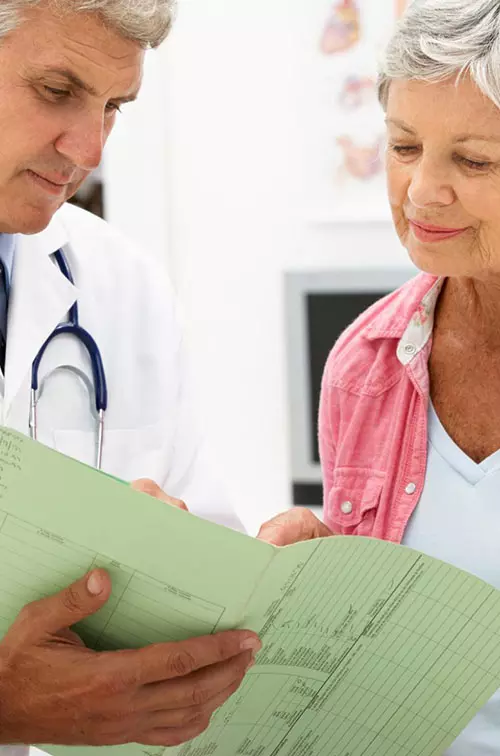Cancer Screenings at AdventHealth Shawnee Mission Care That’s Tailored to You
Keeping track of your day-to-day responsibilities can sometimes feel like work enough. That’s why we’re committed to making it easy for you to stay on top of your cancer screenings.
- Breast Cancer Screening
-
The statistics are staggering: 1 in 8 women will be diagnosed with breast cancer in her lifetime. That’s why we’re making it as easy as possible for you to schedule a screening mammogram.
If you’re age 40 or older and have not had a mammogram in the last year, you don’t need a physician’s order. Just give us a call at Call913-676-2505 or schedule your mammogram online.
If the unexpected happens, you’re in good hands. You can see us on short notice, too, as we offer same-day screenings on weekdays. We’ll be here to walk you through your breast cancer treatment options and get you on the path to whole health.
AdventHealth High Risk Breast Clinic Shawnee Mission
AdventHealth High Risk Breast Clinic Shawnee Mission provides specialized care for individuals with an increased risk of breast cancer due to family history or specific risk factors. Feel confident knowing you’re in the care of a women’s health care network specifically recognized by the American College of Radiology as a Breast Imaging Center of Excellence in mammography, MRI (including MRI biopsy), stereotactic breast biopsy and breast ultrasound.
Risk Factors for Breast Cancer
- Inherited gene mutations associated with increased cancer risks such as BRCA1 and BRCA2
- Family history of breast, ovarian or pancreatic cancer
- Chest radiation treatment before age 30
- Have had two or more breast biopsies
Our team of genetic counselors works with you to understand your personal and family medical histories. Then, we run a simple genetic test that shows us any mutations that make you more likely to develop cancer.
Meet Our Team
No matter your question or concern, our team is here to get you answers, connect you with the right resources and help you find exactly what you need within our care network.
Simran Elder, MD, High Risk Breast Clinic Medical Director, is a medical oncologist and hematologist at AdventHealth Medical Group Hematology Oncology at Shawnee Mission in Merriam, Kansas. Dr. Elder earned her medical degree from the University of Missouri-Kansas City. She also completed her residency in internal medicine and pediatrics at UMKC, during which time she was twice named Internal Medicine Consultant of the Year. She then went on to complete a fellowship in medical oncology-hematology at the University of Maryland School of Medicine.
Lesley Hofer, APRN, FNP-C, AOCNP, earned her bachelor of science in nursing from the University of Missouri-Kansas City and her master of science in nursing from the University of Central Missouri. She is an Advanced Oncology Nurse Practitioner (over 20 years of oncology experience) and a certified family nurse practitioner. Lesley supports patients in the High Risk Breast Clinic and has specialized training in Cancer Risk Assessments through the City of Hope.
To schedule an appointment, contact our office at 913-632-9100.
- Cervical Cancer Screenings
-
Cervical cancer rates have dropped dramatically in the past few decades, thanks to more education and awareness around the importance of an annual cervical cancer screening.
Our primary care providers and OB/GYN physicians at AdventHealth Shawnee Mission are here to guide you in understanding a screening schedule that’s right for you.
If ever the results from your screening come back abnormal, take a deep breath. Our experienced gynecologic oncology team is ready with advanced treatment options that can meet your needs and ease your mind.
- Skin Cancer Screenings
-
Skin cancer is the most common type of cancer in the United States. Often, its first signs or symptoms are new or unusual changes in your skin.
Check your skin regularly or ask your primary care doctor to perform an initial skin cancer screening at your annual wellness exam.
Should you notice any changes to your skin, be sure to schedule an appointment with your dermatologist immediately. Find a dermatologist near you today.
- Lung Cancer Screenings
-
Advances in lung cancer detection are allowing us to detect and diagnose lung cancer in its earlier stages when it’s easiest to treat.
A low-dose computed tomography (CT) scan takes detailed images of your lungs, allowing doctors to find small, early-stage lung cancers that aren’t always seen on traditional X-rays.
We encourage you to discuss your eligibility with your primary care provider if you:
- Are a current smoker, or a smoker who quit within the last 15 years
- Are between 50 and 80 years old
- Have at least a 20 pack-year smoking history*
- No current signs/symptoms of lung cancer (asymptomatic)
Medicare requirements are the same, however, coverage is only provided for ages 50-77.
*A pack-year is calculated by multiplying the number of years smoked by the number of packs smoked in a day. For example, if you smoked one pack of cigarettes a day for 20 years, you have a 20-year pack history. If you smoked two packs a day for 15 years, you have a 30-year pack history.
Call our lung navigator at Call913-632-9109 to learn more about the low-dose CT scan and to schedule an appointment.
- Colon Cancer Screenings
-
When you think about a colorectal screening, you may immediately think of a colonoscopy. Colonoscopies are the most common (and standard) colon cancer screening, but there are other options, depending on your needs.
Stool-Based Tests
These tests evaluate a stool sample that a laboratory will examine for blood and other signs of colon cancer or polyps. These can be done at home, but do need to be done more often.Colonoscopy
A colonoscopy enables your doctor to view the entire colon and rectum and look for signs of polyps or cancerous growths. A small, flexible tube with a light attached is gently inserted into the rectum. A video camera attached to the top of the scope sends images back to your doctor’s computer. You may be given general anesthesia or a sedative to help keep you comfortable. While colonoscopies are recommended every five to 10 years, other colorectal screenings tests like Cologuard should be completed every 3 years.Your doctor can discuss these different colon cancer screenings to help you decide which is best for you. A gastroenterologist can also answer detailed questions and perform the exam.
Find a gastroenterologist near you.

Know Your Risk for Breast Cancer
Knowing your risk for breast cancer is important for your health and well-being. That's why we offer BreastCancerAware. In just 5 minutes, you can easily determine your breast cancer risk through a personalized risk assessment. This free online risk assessment not only provides you with valuable insights but empowers you to make informed decisions about your health care.
Understanding your risk allows for early detection, proactive preventive measures, and personalized screening strategies, all of which significantly improve the chances of successful breast cancer management. So, invest those 5 minutes to know your breast cancer risk – it could be a life-saving decision.
Preventing, Detecting and Overcoming Cancer On Your Side Every Step of the Way
Overcoming cancer is a team sport. That’s why we surround you with the latest advances in treatment, ongoing support and dedicated care. After all, we’re in this together. And we’ll be here to make sure you’re comfortable and confident.
Cancer Programs
Our specialized cancer programs bring high-level and compassionate care to your neighborhood.
Cancer Treatments
We’ll help you find the treatment approach that matches your diagnosis and goals.
Cancer Support and Resources
Strengthen your body, ease your mind and lift your spirits with care that goes beyond doctor’s appointments.

Your Cancer Care Team Get Expert Care Close to Home
When it comes to preventing, detecting and treating cancer, you want the best in your corner. And you’ll find that at AdventHealth Cancer Institute Shawnee Mission. Find oncology specialists, certified nurses and therapists to keep you on the path to whole health.




